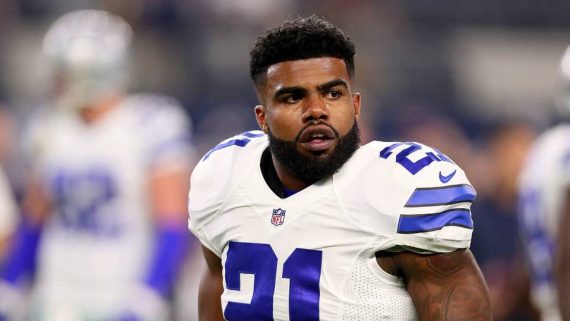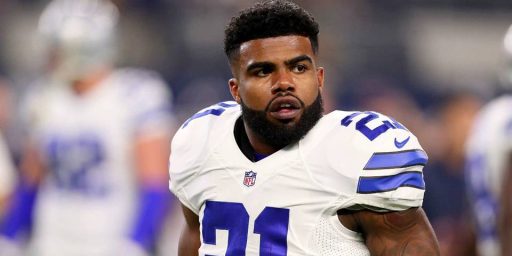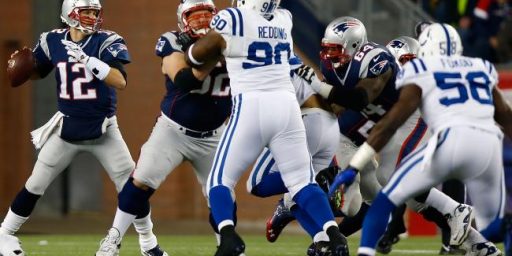Ezekiel Elliott Suspension Reinstated By Federal Appeals Court
A legal setback for Ezekiel Elliott and the Dallas Cowboys.
A three-judge panel of the Fifth Circuit Court of Appeals has reinstated the six-game suspension that the National Football League handed out to Dallas Cowboys Running Back Ezekiel Elliott related to domestic violence charges that never proceeded to prosecution:
A federal appeals court ruling on Thursday allowed the N.F.L. to impose a six-game suspension on the Dallas Cowboys running back Ezekiel Elliott over domestic violence allegations.
The court’s decision, which went 2-1 in favor of the N.F.L., was a blow to the Cowboys and, for now, bolstered Commissioner Roger Goodell’s power to dole out penalties for off-field issues. While the suspension is considered to be immediate, Elliott will have some time to pursue means of delaying or overturning the suspension, because the Cowboys do not play a game in the next 10 days. But without another court ruling, Elliott cannot practice with the Cowboys.
A district court issued an injunction early last month blocking the suspension. But the United States Court of Appeals for the Fifth Circuit on Thursday said that the lawsuit filed on Elliott’s behalf by the N.F.L. Players’ Association was “premature” because the N.F.L. and the players’ union had not exhausted all available procedures in the league’s collective bargaining agreement.
The appeals court, in vacating the injunction Thursday, ruled that the district court had lacked subject-matter jurisdiction to adjudicate the players’ union’s appeal of the suspension.
In a statement Thursday evening, the players’ union said it was “reviewing the decision and considering all options.”
“The appellate court decision focuses on the jurisdictional issues,” the statement said. “The failures of due process by the N.F.L. articulated in the district court’s decision were not addressed.”
The appeals court also ordered the district court to dismiss a case filed by Elliott’s representatives.
Elliott’s lawyer, Frank Salzano, issued a statement about Thursday’s ruling. “We are currently exploring all of our legal options and will make a decision as to what is the best course of action in the next few days,” the statement said. “Until that time we have no further comment on the fifth circuit’s decision.”
In a dissenting opinion to the court’s decision, Judge James E. Graves Jr. said the case centered on undisclosed information, uninformed decisions and an “arguably unfair process” leading to the suspension, and he disagreed that the district court lacked subject-matter jurisdiction.
A crucial part of Graves’s dissent addressed the involvement of Kia Roberts, the N.F.L.’s director of investigations.
“After the N.F.L.P.A. was successful in compelling Roberts’ testimony, the N.F.L.P.A. discovered that Roberts was excluded from meetings with Goodell and outside advisers,” Graves’s dissent said. “The arbitrator then denied the opportunity to question Goodell. The revelation of Roberts’ exclusion suggests that Goodell was not fully informed before making his decision about the appropriate punishment.”
To Graves, that was part of an overall strategy by the N.F.L. that he said, citing legal precedent, met the standard of having “impugned the integrity of the arbitration process.”
A somewhat rocky start to the season for Elliott — possibly caused in part by the distraction of the looming suspension — has contributed to Dallas’s rocky 2-3 start to the season. At this point last season, Elliott, who helped lead the Cowboys to a 14-2 record as a rookie, had 546 rushing yards and five touchdowns. This year he has 393 yards and two touchdowns, and his average yardage per game is 78.6, a significant drop from his average of 108.7 for all of last season.
The league first issued the suspension — the baseline punishment for a first-time domestic violence offender — after a yearlong investigation into allegations made against Elliott in July 2016. Elliott was not arrested or charged by prosecutors, but the N.F.L. used statements by a former girlfriend of Elliott’s, along with photos of injuries he is accused of inflicting upon her, to justify the suspension.
More from ESPN:
FRISCO, Texas — A federal appeals court cleared the way Thursday for the NFL to impose a six-game suspension on Dallas Cowboys star Ezekiel Elliott over domestic violence allegations, siding with the league in the latest high-profile fight over its ability to punish players for off-field behavior.
In a 2-1 decision, the 5th U.S. Circuit Court of Appeals panel in New Orleans granted the league’s emergency request to set aside an injunction and ordered a district court in Texas to dismiss Elliott’s case.
The NFL announced that the suspension was effective immediately, though further appeals were possible and the Cowboys are not playing this weekend.
“We are currently exploring all of our legal options and will make a decision as to what is the best course of action in the next few days,” Elliott’s attorney Frank Salzano said.
The Cowboys don’t play again until Sunday, Oct. 22, at San Francisco. If Elliott’s legal team can’t put the suspension on hold again, he would miss next Sunday’s 49ers game, plus games against the Washington Redskins, Kansas City Chiefs, Atlanta Falcons, Philadelphia Eagles and Los Angeles Chargers. He would be eligible to play again on Nov. 30 at home against Washington, a Thursday night game the week after Thanksgiving.
Elliott played the first five games while the case was in the courts. He rushed for 393 yards on 105 carries, an average of just 3.7 yards. He led the NFL with 1,631 rushing yards last season as a rookie.
A federal judge in Texas issued the injunction blocking the suspension last month, agreeing with NFL players’ union attorneys who argued that the investigation of the allegations in Ohio and a subsequent appeal were unfair to Elliott, one of the league’s standout running backs.
The NFL countered that it followed procedures under the league’s labor deal and that the union improperly filed a lawsuit before the appeals process was complete.
“The NFLPA is reviewing the decision and considering all options,” the players’ union said in a statement Thursday. “The appellate court decision focuses on the jurisdictional issues. The failures of due process by the NFL articulated in the District Court’s decision were not addressed.’
(…)
NFL commissioner Roger Goodell suspended Elliott in August after the league concluded — following a yearlong investigation — that he had several physical confrontations in the summer of 2016 with Tiffany Thompson, his girlfriend at the time. Prosecutors in Columbus, Ohio, decided not to pursue the case, citing conflicting evidence.
Elliott’s legal team filed the lawsuit on his behalf in the Eastern District of Texas before Henderson had rejected the appeal. The 5th Circuit agreed with the NFL’s claim that the filing was premature.
“The procedures provided for in the collective bargaining agreement between the NFL and NFLPA were not exhausted,” Judges Jennifer Elrod and Edward Prado wrote for the majority. “The parties contracted to have an arbitrator make a final decision. That decision had not yet been issued.”
In dissent, Judge James Graves disagreed that the suit was filed prematurely. Graves noted the union’s argument that the league had violated the collective bargaining agreement because key information had been withheld from Goodell and Elliott’s representatives before the suspension was ordered and the arbitrator’s decision was based on incomplete information. The suit was properly filed in the district court because the arbitration process called for in the labor deal was not properly followed, Graves argued.
(…)
The NFL had already agreed to let Elliott play in the opener before his request for an injunction was granted by U.S. District Judge Amos Mazzant in Sherman, north of Dallas. Henderson ruled against Elliott the same day Mazzant heard arguments over the injunction.
Elliott and the NFLPA have several legal options in the wake of this decision, but none of them appear to be likely to succeed at this point. They could seek to have the case reheard by the full Fifth Circuit, or to at least appeal to that body to have the injunction reinstated pending an exhaustion of Elliott’s appeals in the matter, for example. It’s unlikely, though, that the Circuit Court with either grant an en banc hearing on an expedited basis or that it would overrule the panel decision on the fate of the injunction. The NFLPA could also seek to have the injunction reimposed by the Supreme Court, but that also seems as if it would not be a successful strategy. Alternatively, and most likely at this point, is that the NFLPA would seek to move the legal proceedings in this case to the U.S. District Court for the Southern District of New York. The NFL had already filed a lawsuit in that Court seeking to enforce the appeal decision entered in their favor by the arbitrator who heard the appeal of the league’s ruling against Elliott in the original case. In theory at least, that Court could end up ruling in Elliott’s favor and would not be bound by the decision of the Fifth Circuit panel. However, while the decision is not binding it is likely to be cited by the NFL as persuasive authority regarding the issues that Elliott’s attorneys are likely to make against the underlying suspension. In that case, the District Court Judge could well end up following the logic and the conclusions of the Fifth Circuit and ruling in favor of the league. In any case, absent the imposition of a stay Elliott’s suspension would begin with the next game for the Cowboys, which is an away game against the San Francisco 49ers on October 22nd.
As I noted in my post regarding the initial injunction against Elliott’s suspension, in many respects the legal proceeding here mirror those that came in the wake of the four-game suspension that was issued against New England Patriots Quarterback Tom Brady over the so-called “Deflategate” scandal:
In that case, Brady was suspended for four games after an NFL investigation into allegations that the Patriots had used footballs deflated below league standards during the 2015 AFC Championship game against the Indianapolis Colts. Brady appealed that decision pursuant to the process set forth in the current Collective Bargaining Agreement, but league Commissioner Roger Goodell, who had participated in the underlying investigation and the decision on what punishment to impose, ruled against him. At that point, Brady and the National Football League Player’s Association filed suit in Federal Court in New York against the ruling, arguing that the NFL had violated both the terms of the CBA and the Federal law governing arbitrations. In that case, the Federal District Court Judge ended up ruling in Brady’s favor and imposing a stay on the suspension that effectively lasted for the entirety of the 2015-2016 season. Meanwhile, the NFL had appealed the District Court ruling to the Second Circuit Court of Appeals and, in a ruling in April of last year, that Court overturned the District Court ruling, siding with the league and holding that there was sufficient evidence to support the suspension and that there had been no violations of Federal arbitration laws. After initially stating that they would appeal that ruling, Brady and the NFLPA decided to abandon the appeal and Brady served his suspension at the start of the 2016 season. The Patriots, of course, went on win the Super Bowl that season.
As things stand, it looks as though Elliott is headed for the same outcome as Brady, although in his case it appears likely to happen just as the Cowboys are headed into a crucial part of the season for them.
Here’s the Fifth Circuit opinion:
NFLPA Et Al v. NFL Et Al Opinion by Doug Mataconis on Scribd





I agree that Elliot’s ultimate fate is likely the same as Brady’s, given the near-plenary power the CBA gives the commissioner. The only real difference, although I’m not sure it matters given the CBA, is that the Brady case was purely a football issue whereas Elliot’s involves alleged off-field behavior.
But it looks like the 5th Circuit ruling was purely procedural—Elliot filed for the injunction prematurely and in the wrong jurisdiction–rather than about the merits of the case. So I don’t know why that ruling would have any bearing in New York.
@James Joyner:
Fair point, and in any case as I noted the extent to which the Fifth Circuit addresses the merits of the case are not binding on the SDNY or the 2nd Circuit.
One other observation, of course, is that the suspension would almost be over now if Elliott had decided to bite the bullet and take the suspension (especially since the NFL had already conceded that he could play in the home opener notwithstanding the suspension)
The NFL should create a Disciplinary Council with somekind of Due Process, giving all the disciplinary power to the Commissioner(Even if the Commissioner was someone more competent than Goodell) is insane.
As I said when the Ezekiel suspension was first handed down, I suspect that the disciplinary process is going to play a large role in the next round of labor talks between the NFL and the NFLPA.
I am certainly not a legal expert; the following is an opinion by a guy with internet access as his only credential. To me this is similar to campus sex crime investigations. We all believe in the full protections of our system for criminal trials, but a lot of things happen that don’t end up being adjudicated inside a court room. Does an employer, in this case the NFL, or a university, in campus sex misbehavior investigations, have to go through a process that has the strict protections that a court has? In the past, employment was at will, and the employer could sanction people on fairly arbitrary grounds. Schools could sanction people based on all kinds of things like hair length, dress code, etc. It seems that we have moved more and more toward requiring a full, formal court room setting for these things. One football player does not matter much to the national well being, but shouldn’t we have some mechanism other than the full weight of the courts for dealing with misdeeds?
@Slugger: You can have due process within administrative procedures. Liberals are shooting themselves on the foot when they defend at will firings or expulsions without due process because they are defending at will firings without collective bargaining.
@Andre Kenji: I had a small business once, and we fired someone for diverting some payments. We did not go through a formal process to do this. In a court room setting, we would have had trouble meeting the standards expected in the court-room. We just confronted the person, and asked questions without Mirandarizing the interview. Are you saying that we should have undertaken a formal inquiry with lawyers, a neutral arbitrator, cross-examinations, etc? That seems like a burdensome process.
The NFL is a big, big business and probably has lawyers and investigators on staff. However, allegations like domestic abuse and sexual misdeeds are hard to prove. That does not mean that they don’t occur. I think that O.J. killed Nicole despite the acquittal.
“When Mr. Jones talks, people listen”
@Slugger:
No. I think that Labor law should allow some protections when they are fired because they are accused of serious transgressions and I think that Liberals are shooting themselves in the foot when they dismiss due process in administrative procedures – precisely the problem when students are accused of sexual assault in Universities, and when they defend at-will firings for people that they don’t like.
The NFL would gain if these kind of punishments were perceived to be fair, and frankly, they are not.
@Andre Kenji:
For the life of me, I do not understand how colleges and universities got into the habit of adjudicating alleged sexual assaults. Acting after or in conjunction with the actual legal process? Sure. Willfully not reporting possible crimes and issuing administrative punishments (unless there’s a coverup because the athletic department is involved)? Who thought that was a good idea?
In the case of the NFL or other at-will firings, however, it’s best to file them under the category of “Life Is Not Fair.” Excessive legalism can be just another name for totalitarianism.
Mike
@Slugger:
The biggest issue is that the league has to abide by existing labor laws, as well as the provisions of the Collective Bargaining Agreement with the NFLPA. To a large degree, the lawsuits that people like Rice, Brady, and Elliott have filed over league discipline in the past have been based on alleged violations of that agree or of existing labor laws.
@Slugger:
The biggest issue is that the league has to abide by existing labor laws, as well as the provisions of the Collective Bargaining Agreement with the NFLPA. To a large degree, the lawsuits that people like Rice, Brady, and Elliott have filed over league discipline in the past have been based on alleged violations of that agree or of existing labor laws.